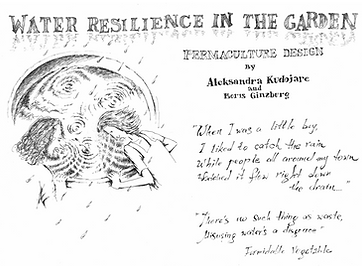
DESIGNS
In May 2025, Aleksandra obtained her Diploma in Applied Permaculture Design through the British Permaculture Association with Delvin Solkinson as her main mentor. Aleksandra has created four land-based designs for her own homestead as well as six social designs, which include teaching and permaculture outreach projects.
"Aleksandras designs er betydningsfulde bidrag til det voksende globale bibliotek af permakulturdesigns og udgør fremragende studier for alle, der ønsker at forstå, hvordan de kan blive bedre til at tage vare på jorden, hinanden og vores fælles fremtid",- Delvin Solkinson.

Forest Garden
Designing the first forest garden of your own is a thrilling experience. Getting to plan the plant guilds, the different layers from ground covers to climbers and watch it grow significantly in just a few years is a wonderful adventure. This project is about transforming 100m2 of lawn into a small forest garden that can sustain a family of five with perennial vegetables and berries.
Fruit Orchard
In this design, about 600 m2 of lawn are used to establish a permaculture fruit orchard, focusing on fruit and berry production, that in the future can sustain us with a variety of fruits. And at the same time we intended to create an excellent habitat for wildlife, focusing on variety of herbaceous flowering ground covers as a means to attract more varied insect life.


"Permaculture garden"
In this design, together with the Permaculture Denmark Association (PKDK), I set out to develop a new permaculture demonstration concept. The specific goals were to develop an alternative to the LAND demonstration idea that would enable larger participation and more spread of permaculture.
Demonstration lot
This design was about creating a miniature permaculture
demonstration lot facing the street. You can see the final design
in Miro.


Resilient Cooking
This design emerged from feeling overwhelmed by the responsibility of preparing wholesome, home-cooked meals using garden and wild harvests, and a desire to share that load with my family. It revealed that the core issue wasn’t a lack of skills, but rather the need for better routines, structure, and knowledge-sharing—leading to the creation of resilient cooking principles and tools to support shared responsibility





